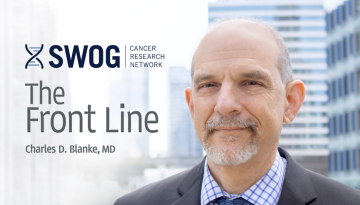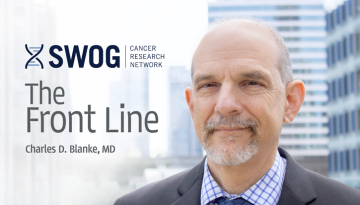Lung Committee on a Trial Activation Roll
SWOG Cancer Research Network has activated seven trials in 2020. Six of those seven have come from just one team: our lung cancer committee. Formerly chaired by Dr. David Gandara and now by Dr. Karen Kelly, lung has always been a powerhouse. But this group is outdoing itself – and during a pandemic to boot.
It’s an impressive mix of studies. Two are practice-changing randomized phase III trials, and one is the first biomarker-driven trial in small cell lung cancer. Two others are FDA drug registration studies that are part of our Lung-MAP precision medicine trial. I’m pleased to report we’ve got three Lung-MAP sub-studies open and a very healthy pipeline of industry prospects. It’s a testament to Lung-MAP’s outstanding leadership and strong partnerships with the National Cancer Institute, Foundation for the National Institutes of Health and Friends of Cancer Research that the trial remains robust and relevant for patients with non-small cell lung cancer. Since it expanded in January 2019 to include adenocarcinoma histology, Lung-MAP has since screened 1,383 patients and assigned 677 to sub-studies. Even with the coronavirus raging, the trial is still bringing new patients on at a steady clip.
Here is an overview of the SWOG lung studies that have launched this year:
- S1827 “MRI Brain Surveillance Alone Versus MRI Surveillance and Prophylactic Cranial Irradiation (PCI): A Randomized Phase III Trial in Small-Cell Lung Cancer (MAVERICK)” led by Dr. Chad Rusthoven. This study’s primary objective is to compare overall survival with MRI surveillance to MRI surveillance combined with prophylactic cranial irradiation for the treatment of small cell lung cancer.
- S1900C “A Phase II Study of Talazoparib plus Avelumab in Patients with Stage IV or Recurrent Non-Squamous Non-Small Cell Lung Cancer Bearing Pathogenic STK11 Genomic Alterations” is a Lung-MAP sub-study led by Drs. Ferdinandos Skoulidis and Jennifer Marie Suga. This FDA registration trial’s primary objective is to evaluate the objective response rate with talazoparib plus avelumab in patients with stage IV or recurrent non-squamous non-small cell lung cancer bearing pathogenic STK11 genomic alterations that were previously treated with anti-PD-1/PD-L1 therapy and platinum-based chemotherapy. The study’s other primary aim is to evaluate the disease control rate at 12 weeks after trial registration.
- S1900B “A Phase II Study of Selpercatinib (LOXO-292) in Patients with RET Fusion-Positive Stage IV or Recurrent Non-Small Cell Lung Cancer” is a Lung-MAP sub-study led by Drs. Yasir Elamin and Jhanelle E. Gray. This FDA registration trial’s primary objective is to evaluate the objective response rate by blinded independent centralized review associated with selpercatinib (LOXO-292) in patients with previously-treated stage IV or recurrent RET fusion-positive non-small cell lung cancer.
- S1914 “A Randomized Phase III Trial of Induction/Consolidation Atezolizumab (NSC #783608) + SBRT Versus SBRT Alone in High Risk, Early Stage NSCLC” led by Drs. Megan Daly and Charles B. Simone. The study’s primary objective is to compare overall survival in patients with inoperable, early stage non-small cell lung cancer randomized to stereotactic body radiation therapy with or without atezolizumab.
- S1933 “A Pilot Study of Hypofractionated Radiotherapy Followed by Atezolizumab Consolidation in Stage II or III NSCLC Patients with Borderline Performance Status” led by Dr. Raid Aljumaily. The primary objective of this study is to evaluate the rate of grade 3-5 treatment-related adverse events in patients who are not candidates for surgery or concurrent chemoradiation and who have either performance status 0-2 and stage II or performance status 2 and stage III non-small cell lung cancer treated with hypo-fractionated thoracic radiotherapy followed by atezolizumab.
- S1929 “Phase II Randomized Study of Maintenance Atezolizumab Versus Atezolizumab in Combination with Talazoparib in Patients with SLFN11 Positive Extensive Stage Small Cell Lung Cancer” led by Drs. Nagla Abdel Karim and Karen Lynn Reckamp. The primary aim of this trial is to compare progression free survival among participants with Schlafen family member 11 (SLFN11) positive extensive stage small cell lung cancer randomized to atezolizumab or atezolizumab plus talazoparib as maintenance therapy.
This explosion of SWOG trials mirrors a national trend in lung research progress. In less than two months’ time this spring, the FDA approved seven new treatments for lung cancer. There are more on the way. A variety of new treatments – from immunotherapies to ALK and EGFR inhibitors – are currently in clinical trials. For a snapshot of lung cancer advances, check out this NCI overview.
And there are some funding bright spots. Stand Up 2 Cancer just announced a $5 million award to fund research and education efforts aimed at achieving health equity for underserved lung cancer patients, including Black people and people living in rural communities.
My thanks to our hard-working lung committee and to Dr. Kelly for her leadership. Thanks also to the lung protocol team at SWOG – Crystal Miwa, Gretchen Goetz, Mariah Norman, and Laura Gildner. A nice model for the rest of our Group!
Other Recent Stories



